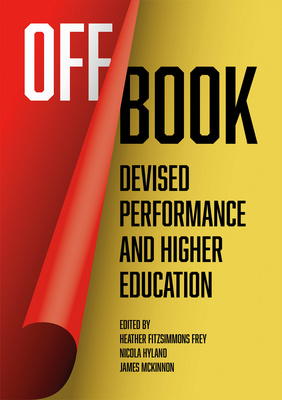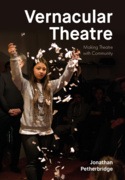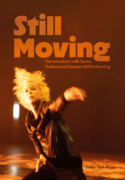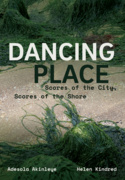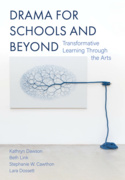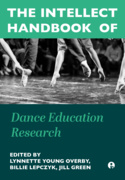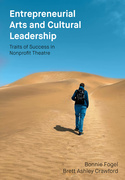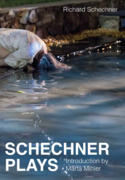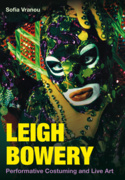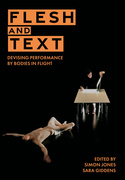Off Book (Book)
Devised Performance and Higher Education
Collection of essays exploring ways that theatrical devising supports and defies higher education’s institutional goals. Considering power, timelines, colonial structures, inclusion and exclusion, research, community engagement, and student learning outcomes, the authors examine devising in Canada, Australia, and Aotearoa New Zealand. 34 b&w illus.
Edition
In the theatre world, ‘off book’ signifies a deadline in the creative process: the date by which performers are to have memorised their lines and will no longer be allowed to carry their play script – the ‘book’ – on stage. As such, Off Book makes a strangely appropriate title for a book about devised performance in higher education. In its usual context, ‘off book’ captures the tension between ephemeral, live performance and durable, author-ized literature: in one sense, the book – the written play – is the essential core, the seed that gives the performance life and meaning. Yet the opposite could be equally true: an ‘on book’ performance would not really be a play at all, and an actor reciting lines out of a script in hand is not really acting. A play is only realised in, or through, a performance. We cannot really learn, or play, our part until we can put the book down and enter the stage without it.
Devised performance might be described as ‘theatre without the book.’ Yet devisors also often use books – books like this one, practical guidebooks and how-to manuals, as well as a myriad of literature outside the discipline mined for inspiration. This is particularly manifest when devising in the context of higher education - a milieu, like theatre, wherein books traditionally signify authority, status, and meaning. So, to the extent that theatres and campuses are places where one expects everything to be done ‘by the book,’ devising on campuses is rebellious, even sacrilegious. But on the other hand, both the theatre and the university are expected to challenge tradition, defy expectations, and conduct experiments.
The book is presented in four sections reflecting the range of roles devising plays in higher education. The first section, Devising Pedagogy: Teaching Transferable Tools, examines how and why practitioners, educators, and programs conceptualise and plan for devising with adult learners in a range of higher education contexts. The second, Devising Friction: Ensembles, Individuals, and the Institution, shifts the discussion to the classroom, where abstract, pedagogical rubber meets the road of concrete reality. The third, Devising (by) Degrees, Practice-led postgraduate devising projects features contributions by emerging scholar-practitioners who engage with devising as both an object and method of creative scholarship. Finally, the chapters in Devising Bridges: University-Community Engagement explore how devising connects higher education institutions with the public they are intended to serve — particularly in populations and communities that are marginalised within, or even explicitly excluded from participating in, higher education, such as children and people with intellectual disabilities.
A valuable and unique resource for drama educators in universities, university students in education, drama, and arts managements, graduate students conducting research, theatre historians, practicing devised theatre artists.
Heather Fitzsimmons Frey is an assistant professor of Arts and Cultural Management at MacEwan University in Edmonton, Alberta, Canada. Her research focuses on arts and performance practices for / by / with young people.
Nicola Hyland is a senior lecturer and Pouakorangi/Programme Director of the Theatre Programme at Te Herenga Waka Victoria University of Wellington, New Zealand. Her research focuses on Indigenous performance, adaptive and hybrid dramaturgy, and devising methodologies.
James McKinnon joined the faculty at Quest University Canada in 2018. His teaching and research focus on developing creative and conative skills through adaptation, devised performance, and storytelling.
List of Figures
List of Tables
1. Throw away the Book: Devising and Higher Education – Heather Fitzsimmons Frey, Nicola Hyland and James McKinnon
2. Up Top/Down Low: Devising and Higher Education in Aotearoa New Zealand and Canada – Heather Fitzsimmons Frey and Nicola Hyland
PART 1: DEVISING PEDAGOGY: TEACHING TRANSFERABLE TOOLS
3. ‘The Science Behind the Poetry’: Articulating a Pedagogy for Devising in the Tertiary Sector – Lynne Bradley and Steph Kehoe
4. Experiential Learning Theory as a Pedagogical Frame for Devising in the D12Dreaming Project – Sarah Peters
5. Teaching the Cycles REPÈRE: A Conversation with Jacques Lessard – Gabrielle Houle
6. ‘But I’m Not a Drama Teacher’: Devising Identity in Teacher Education Programmes – Kelsey Jacobson
7. Teaching Devising for Young Audiences – Heather Fitzsimmons Frey
8. Devising in the Twenty-First-Century University: Contexts, Constraints and Creative Messiness – Glenn D’Cruz, Rea Dennis, Yoni Prior, Kate Hunter, Louise Morris with Mary Luckhurst (moderator)
PART 2: DEVISING FRICTION: ENSEMBLES, INDIVIDUALS AND THE INSTITUTION
9. Climate Change and Devising Theatre Landscapes: A Discussion on the Collaboration and Development of
an Ecocritical and Sustainable Performance – Linda Hassall
10. Memories of the Future: The Problem of Devising Contested History in a University Context – Pedro Ilgenfritz and Paul Janman
11. Devising ImPossibility: How to Turn an Early Modern Ending on Its Head in Celebration of Aotearoa New Zealand’s Marriage Equality Act – Megan Evans
12. Devising Exodus – James McKinnon
13. We’re All on this Waka: Utilizing Māori Narrative Forms in Collaborative Devising – Nicola Hyland
PART 3: DEVISING (BY) DEGREES
14. Devising with Empathy – Hannah Joyce Banks
15. The Inside Project: Towards a ‘Universal’ Inclusive Theatre Devising Framework for Disabled and
Non-Disabled Collaborators – Milly Cooper, Peter Copeman and Stacy Holman Jones
16. The Many Hats of the Applied Theatre (Student) Facilitator: Devising Across the Whole Community – Anita Hallewas
17. Working Together as One: Directing Devised Autobiographical Solo Performance – Sally Richards
PART 4: DEVISING BRIDGES: UNIVERSITY–COMMUNITY ENGAGEMENT
18. Giving – and Taking – Voice: Self-Devising Theatrical Performance with Learning-Disabled Actors – Tony McCaffrey
19. Devising as Research: Challenging Power and Ethics in Methodology through the Onion Theatre Project –Taiwo Afolabi and Leah Tidey
20. Working with Children: Intergenerational Devising Across Institutions – Kerryn Palmer
21. Collaborating with Soldiers in Devising Contact!Unload – George Belliveau and Graham W. Lea
22. Afterwards: A Conversation about Devising and Higher Education in a Post-Pandemic World – Heather Fitzsimmons Frey, Nicola Hyland and James McKinnon
Notes on Contributors

